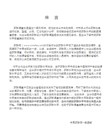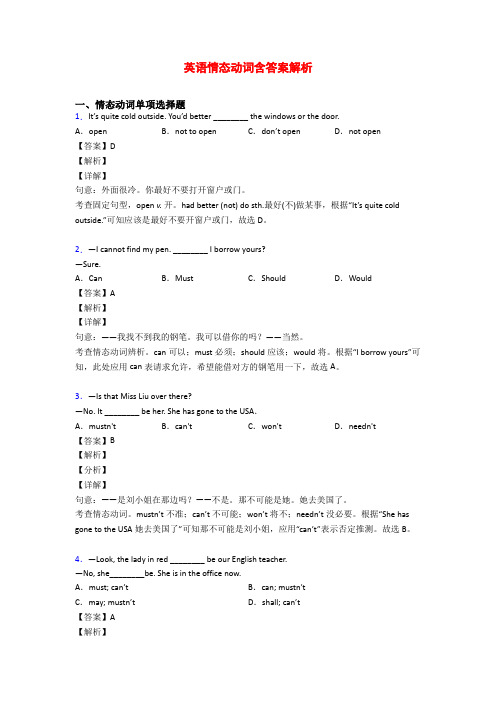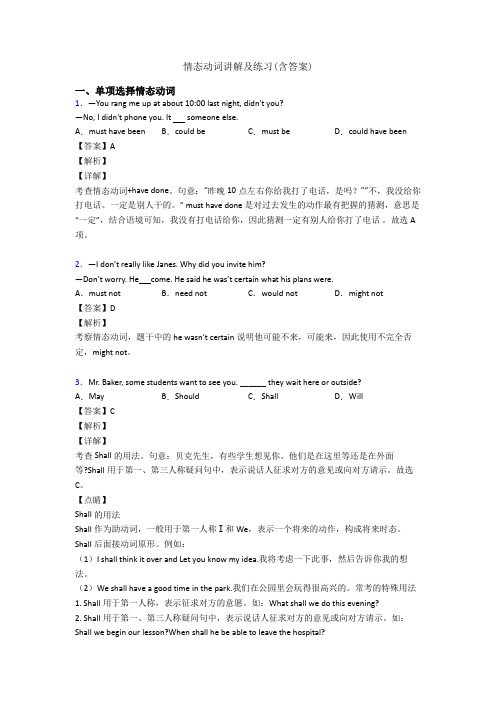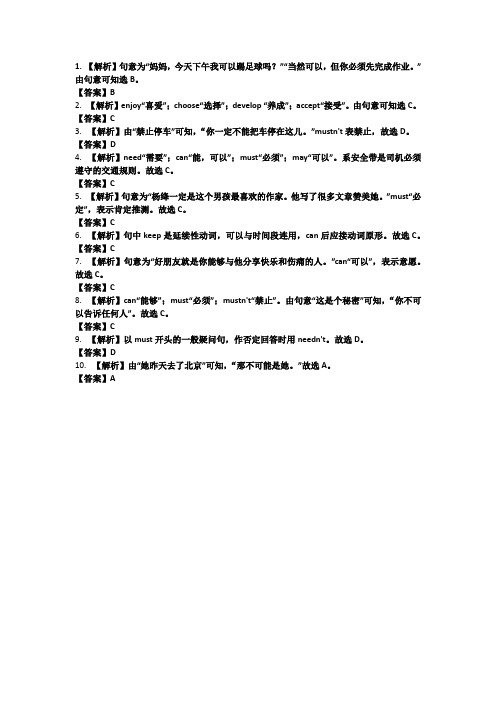情态动词(讲义及答案)
高中英语语法讲义-情态动词

He may [might] be writing a letter. 他可能在写信。
They may [might] be going abroad next month. 他们可能在下个月出国。
③ 后接动词完成式,表示对过去可能发生的事进行推测:
另外,could还可与表示感知的动词(如see, hear, smell, taste, feel, understand等)连用表示的特定能力:
Looking down from the plane, we could see lights on the runway. 从飞机上向下看,我们可以看见机场跑道上的点点灯火。
2) 表示委婉的批评或责备:
You might have made greater progress. 你的进步本来可更大一些的。
You might at least have answered my letter. 你至少可以回我一封信嘛。
③ 表示“差点儿就要”:
I could have died laughing. 我差点儿笑死了。
二、may与might的用法
1. 表示允许
注意以下两种情况:
(1) 表示请求允许(即请求别人允许自己做某事),两者都可用,只是 might 表示的语气较委婉(但并不表示过去):
May [Might] I sit here? 我可以坐在这里吗?
1) 表示过去某事可能发生而实际上却并没发生:
A lot of men died who might have been saved.很多人本来可以获救的却死了。
It was really very dangerous. I might have killed myself. 那真的是太危险了,我差点没命了。
英语情态动词含答案解析

英语情态动词含答案解析一、情态动词单项选择题1.It’s quite cold outside. You’d better ________ the windows or the door.A.open B.not to open C.don’t open D.not open【答案】D【解析】【详解】句意:外面很冷。
你最好不要打开窗户或门。
考查固定句型,open v. 开。
had better (not) do sth.最好(不)做某事,根据“It’s quite cold outsi de.”可知应该是最好不要开窗户或门,故选D。
2.—I cannot find my pen. ________ I borrow yours?—Sure.A.Can B.Must C.Should D.Would【答案】A【解析】【详解】句意:——我找不到我的钢笔。
我可以借你的吗?——当然。
考查情态动词辨析。
can可以;must必须;should应该;would将。
根据“I borrow yours”可知,此处应用can表请求允许,希望能借对方的钢笔用一下,故选A。
3.—Is that Miss Liu over there?—No. It ________ be her. She has gone to the USA.A.mustn't B.can't C.won't D.needn't【答案】B【解析】【分析】【详解】句意:——是刘小姐在那边吗?——不是。
那不可能是她。
她去美国了。
考查情态动词。
mustn’t不准;can’t不可能;won’t将不;needn’t没必要。
根据“She has gone to the USA她去美国了”可知那不可能是刘小姐,应用“can’t”表示否定推测。
故选B。
4.—Look, the lady in red ________ be our English teacher.—No, she________be. She is in the office now.A.must; can’t B.can; mustn'tC.may; mustn’t D.shall; can’t【答案】A【解析】【详解】句意:——看,穿红衣服的那位女士一定是我们的英语老师。
情态动词讲解及练习(含答案)

情态动词讲解及练习(含答案)一、单项选择情态动词1.—You rang me up at about 10:00 last night, didn't you?—No, I didn't phone you. It someone else.A.must have been B.could be C.must be D.could have been 【答案】A【解析】【详解】考查情态动词+have done。
句意:“昨晚10点左右你给我打了电话,是吗?”“不,我没给你打电话。
一定是别人干的。
” must have done 是对过去发生的动作最有把握的猜测,意思是“一定”,结合语境可知,我没有打电话给你,因此猜测一定有别人给你打了电话。
故选A 项。
2.—I don’t really like Janes. Why did you invite him?—Don’t worry. He come. He said he was’t certain what his plans were.A.must not B.need not C.would not D.might not【答案】D【解析】考察情态动词,题干中的he wasn’t certain说明他可能不来,可能来,因此使用不完全否定,might not。
3.Mr. Baker, some students want to see you. ______ they wait here or outside?A.May B.Should C.Shall D.Will【答案】C【解析】【详解】考查Shall的用法。
句意:贝克先生,有些学生想见你。
他们是在这里等还是在外面等?Shall用于第一、第三人称疑问句中,表示说话人征求对方的意见或向对方请示。
故选C。
【点睛】Shall的用法Shall作为助动词,一般用于第一人称Ⅰ和We,表示一个将来的动作,构成将来时态。
初一情态动词讲解及练习附答案

(could), may (might), must, have to, shall (should, will (would), dare (dared), need (needed), ought to等。
情态动词无人称和数的变化;不能单独使用,必须与其后的动词原形构成谓语一、can, could1) 表示能力(体力、知识、技能)。
Can you lift this heavy box?(体力)Mary can speak three languages.(知识)Can you skate?(技能)此时可用be able to代替。
Can只有一般现在时和一般过去式;而be able to则有更多的时态。
I’ll not be able to come this afternoon.当表示“经过努力才得以做成功某事”时应用be able to,不能用Can。
如:He was able to go to the party yesterday evening in spite of the heavy rain.2) 表示请求和允许。
-----Can I go now? ----- Yes, you can. / No, you can’t. 此时可与may互换。
在疑问句中还可用could, might代替,不是过去式,只是语气更委婉,不能用于肯定句和答语中。
---- Could I come to see you tomorrow? ---- Yes, you can. ( No, I’m afraid not. )3) 表示客观可能性(客观原因形成的能力)。
They’ve changed the timetable, so we can go by bus instead. This hall can hold 500 people at least.4) 表示推测(惊讶、怀疑、不相信的态度),用于疑问句、否定句和感叹句中。
7情态动词答案

1. 【解析】句意为“妈妈,今天下午我可以踢足球吗?”“当然可以,但你必须先完成作业。
”由句意可知选B。
【答案】B
2.【解析】enjoy“喜爱”;choose“选择”;develop “养成”;accept“接受”。
由句意可知选C。
【答案】C
3.【解析】由“禁止停车”可知,“你一定不能把车停在这儿。
”mustn't表禁止,故选D。
【答案】D
4.【解析】need“需要”;can“能,可以”;must“必须”;may“可以”。
系安全带是司机必须遵守的交通规则。
故选C。
【答案】C
5.【解析】句意为“杨绛一定是这个男孩最喜欢的作家。
他写了很多文章赞美她。
”must“必定”,表示肯定推测。
故选C。
【答案】C
6.【解析】句中keep是延续性动词,可以与时间段连用,can后应接动词原形。
故选C。
【答案】C
7.【解析】句意为“好朋友就是你能够与他分享快乐和伤痛的人。
”can“可以”,表示意愿。
故选C。
【答案】C
8.【解析】can“能够”;must“必须”;mustn't“禁止”。
由句意“这是个秘密”可知,“你不可以告诉任何人”。
故选C。
【答案】C
9.【解析】以must开头的一般疑问句,作否定回答时用needn't。
故选D。
【答案】D
10.【解析】由“她昨天去了北京”可知,“那不可能是她。
”故选A。
【答案】A。
英语情态动词附答案附答案含解析

英语情态动词附答案附答案含解析一、选择题1.You'd better __________ hard from now on, __________ you will fail the exam. A.work; and B.working; or C.working; and D.work; or 2.Don’t cross the road until the traffic lights turn green. A car_______hit you.A.need B.may C.should D.must 3.—Mum, I bought some strawberries on my way home.—Oh, you’re so sweet. But the strawberries ________ be put into the fridge for freshness. A.must B.can C.may D.need4.— What do you think of the show yesterday?— Some of them were really good but others ________ be better.A.will B.must C.need D.can5.—I don’t care what people think.—Well, you _______ . Some opinions are worth weighing.A.should B.might C.could D.would6.We teenagers ________ have dreams. With dreams and hard work, anything amazing________ be created.A.may; can B.might; should C.should; can D.must; has to 7.You ________ be careful with the camera. It costs!A.can B.will C.should D.may 8.—Who’s singing next door? Is it Miss Wang?—It ________ be her. She’s having the board meeting.A.can’t B.shouldn’t C.mustn’t D.needn’t 9.—The high school entrance examination is coming!— Yes, our teacher tells us we ________ be too careful while taking exams.A.mustn’t B.shouldn’t C.needn’t D.can’t 10.—There is a knock at the door.—It ________ be my mom. She always comes back home at this time.A.may B.may not C.must D.can’t11.We shouldn’t throw any objects from the building. Even a small object ________ cause serious injuries or death, when dropped from a great height.A.must B.should C.may D.need 12.—Could you tell me how to renew the library books?—With pleasure. You ________ come to our desk every time. It’s easier to renew them online. A.can’t B.mustn’t C.needn’t D.shouldn’t 13.— Is Lang Lang going to perform at Art Center this Friday?— Yes. It ________ be him. He has been here for three days.A.might B.must C.mustn’t D.may14.— The sandstorm in Beijing is so serious this year.— Yes, I wonder when we ________ worry about the air we breathe.A.can’t B.mustn’t C.needn’t D.shouldn’t 15.—Where is Tom? I am considering ________ him about the result of the exam.—Oh. You ________. He has known it already.A.to tell; can't B.telling; needn't C.tell; mustn't D.told; shouldn't 16.It’s amazing that the pen ________turn voice into text with few mistake s.A.can B.must C.may D.need17.If you buy your mum an iRobot floor cleaner, she ________ sweep the floor every day. A.can’t B.mustn’t C.needn’t D.shouldn’t 18.Please don't make so much noise. I ________ hear the speaker very well.A.needn't B.can't C.shouldn't D.mustn't 19.We’ve discussed every detail of this plan and have got everything ready. But still something __________ go wrong. We still have to be very careful.A.must B.should C.would D.may 20.—Amy, I hear you've got many foreign coins._______ I have a look?—Of course, I'll fetch them for you.A.May B.MustC.Should D.Need21.When I was young, my father ___________ take me to climb the hill which was not far from our house.A.may B.must C.would D.should22.My bike was broken yesterday,so I____walk home.A.might B.had to C.must D.could 23.—Would you please________in that way? That’s not safe!—Sorry. I won’t do it any more.A.not driving B.not to drive C.no driving D.not drive 24.Dr. Zhong Nanshan once said, "To prevent the spread of this disease, we________never be too careful."A.can B.may C.must D.should 25.—Dad, must we wait until the light becomes green?—Yes, I am afraid we ________. That’s the traffic rule.A.may B.can C.have to D.need26.— Mum, why do I have to wash hands so many times a day?—You ________ be too careful, for your health.A.can’t B.mustn’t C.may not D.needn’t 27.—Who is singing next door? It sounds like a young girl’s voice.—It _________ be Jane. But she seldom sings English songs.A.need B.must C.may D.can28.You ________ require others to do with the problem like you. Everyone has his own way. A.mustn’t B.needn’t C.may not D.shouldn’t29.—I must go to school today, ________?—No, you ________.You can go as soon as you get well.A.mustn’t I;needn’t B.needn’t I;needn’tC.must n’t I;mustn’t D.needn’t I;mustn’t30.— Excuse me, could you tell me where the Nanjing Brocade Museum is?—Go along this road for five minutes. You ________ miss it. It’s a huge building.A.mustn’t B.can’t C.needn’t D.shouldn’t 31.—Why didn’t you tell it to me earlier?— Why ________ I? I want to have my own secret.A.can B.may C.should D.shall32.A hard-working man ________ become a great scientist, but a great scientist ________ be a hard-working man.A.can’t; can B.may not; must C.can’t; must D.may not; can 33.— Listen! Tom ________ be listening to the music while doing his homework.—Let’s go upstairs to remind him to turn it off.A.should B.could C.would D.must 34.—Must I finish all my homework today, Mum?—No, you ________, my dear. You can finish some tomorrow if you like.A.needn’t B.shouldn’t C.can’t D.mustn’t 35.—Suzy described every detail of the accident just now.—Her memory ________ be completely back.A.shall B.need C.must D.could36.—Is that Mr Zhou?—It ________ be him. He has gone to Beijing.A.can B.may C.can’t D.shouldn’t 37.—How beautiful the winter jasmines (迎春花) are!—Yes. These golden-yellow flowers ________ be widely seen in my city in March.A.must B.can C.would D.should38.Most young people like shopping online because they ________ spend much time going from shop to shop.A.needn’t B.can’t C.mustn’t D.shouldn’t 39.—Could I join you in the programme?—Sorry, you ________. You are too young.A.shouldn’t B.mustn’t C.can’t D.needn’t 40.—Will Jim come to Yangzhou for a holiday?—He ________come and it depends on how much homework he will have.A.may B.should C.must D.need41.— Is the boy over there Tom? He often wears a jacket like that.— It _______ be him. He is absent from school today.A.needn’t B.shouldn’t C.mustn’t D.can’t42.When people are waiting at the zebra crossing, cars and buses ________ wait and let them go first.A.must B.may C.can D.need 43.—Shall I tell him the change of the time right now?—I’m afraid you ________, otherwise he will be late for the meeting.A.can B.may C.must D.need44.—Will dad arrive home at 6 o’clock to have dinner with us this evening?— I think he will, but he ________ not. Sometimes he works extra hours.A.can B.must C.need D.may45.—Must we stop the Japanese government discharging nuclear waste water (排放核污水) into the Pacific Ocean?—________. Because everyone should protect our earth and it is bad ________ us to eat the polluted seafood and drink the waste water.A.Yes, we can; of B.No, we mustn’t; of C.Yes, we must; for D.No, we needn’t; for 46.Look at the floor, Tom! ________ you watch TV while having a meal?A.Should B.Could C.Must D.May 47.—Excuse me. I haven’t finished reading the book yet. May I keep it a bit longer?— Sorry, you ________. You must return it on time.A.needn’t B.can’t C.won’t D.shouldn’t 48.You’ve got an A in the maths test again. You ________ be good at it.A.can B.may C.must D.should49.Mr. Black ________ be at home now. He went abroad on vacation last Friday.A.can’t B.mustn’t C.needn’t D.shouldn’t 50.Never throw objects from the building. Even a small object ________ cause serious injuries, or death, when dropped from a great height.A.must B.should C.may D.need【参考答案】***试卷处理标记,请不要删除一、选择题1.D解析:D【详解】句意:你最好从现在开始努力学习,否则你考试会不及格的。
情态动词(讲义及答案)

情态动词(讲义)一、can, could, may, might 表示请求许可1.区别Can I take the book awayCould I take the book awayMay I take the book awayMight I take the book away语气的委婉程度从高到低为 can, could, may, might。
2.can, could, may, might 表示请求许可时的回答。
—Can you give me another chance—Yes, I can. No, I can’t.—Could I look at your pictures—Yes, of course you ./—I am sorry you .#用c ould 提问,表示“能……吗”,若表示同意用 can,不同意用c an ’t,注意不用 could 来回答。
—May I speak to you for a moment in private, pleaseMay 表示请求许可时,常常与第一人称 I 连用,构成“May I…”句式,表示“我可以……吗”肯定回答用 Yes, you may. / Yes, please. / Yes, of course.否定回答用N o, you can’t. / No, you mustn’t. ( )—May I smoke here—, you . It can be dangerous.A.Yes; canB. No; can’tC. Yes; mayD. No; needn’tMight I come inMight I borrow some moneymight 用于礼貌的询问是否能做某事,常出现在口语中,用法稍显过时。
肯定回答通常用 may,否定回答可以用 can’t 或者 mustn’t。
练习:~( )—Can I get you a drink—. I am not thirsty.A.That’s very nice of youB. No, you don’t have toC. Yes, pleaseD. With pleasure ( )—May I leave the classroom now 1—No, you . You shouldn’t le ave until the bell rings.A. may notB. can’tC. needn’tD. couldn’t( )—you pass me a pen I’d like to write down the telephone number.A. NeedB. CouldC. MustD. Should ( )—Could I use your eraser for a while—Yes, of course you .A. couldB. willC. canD. should二、情态动词和短语情态动词1.情态动词needThe little girl needs to get some sleep.I needed two more days to finish thework. Do you need to have some coffeeneed 作实义动词,有人称,时态的变化。
专题07 情态动词和虚拟语气(讲义)

专题07 情态动词和虚拟语气(讲义)目录考点情态动词和虚拟语气---------------------------------------------------------------------------------------------------------1页---------------------------------------------------------------------------=------------------------------------------1页------------------------------------------------------------------------------------------------------------------------2页【真题研析·规律探寻】-----------------------------------------------------------------------------------------------------2页考向1考查情态动词的基本用法----------------------------------------------------------------------------------------------------------------2页考向2考查情态动词的基本含义及用法--------------------------------------------------------------------------------------------------------2页考向3考查虚拟语气中----------------------------------------------------------------------------------------------------------------------------3页【核心提炼·考向探究】----------------------------------------------------------------------------------------------------3页1.情态动词的基本用法----------------------------------------------------------------------------------3页2.情态动词后跟完成式的用法----------------------------------------------------------------------------7页3.虚拟语气的常用用法-------------------------------------------------------------------------------------------------------------------------------------7页【题型特训·命题猜测】-------------------------------------------------------------------------------------------------------------7页猜测考向1 考查情态动词的基本用法----------------------------------------------------------------------------------------------------------------8页猜测考向2 考查情态动词+完成式的用法-----------------------------------------------------------------------------------------------------------8页猜测考向3 考查虚拟语气--------------------------------------------------------------------------------------------------------------------------------8页考点 情态动词和虚拟语气考情分析:分析2021-2023年新高考有关情态动词和虚拟语气的考向分布。
- 1、下载文档前请自行甄别文档内容的完整性,平台不提供额外的编辑、内容补充、找答案等附加服务。
- 2、"仅部分预览"的文档,不可在线预览部分如存在完整性等问题,可反馈申请退款(可完整预览的文档不适用该条件!)。
- 3、如文档侵犯您的权益,请联系客服反馈,我们会尽快为您处理(人工客服工作时间:9:00-18:30)。
情态动词(讲义)一、can, could, may, might 表示请求许可1.区别Can I take the book away?Could I take the book away?May I take the book away?Might I take the book away?语气的委婉程度从高到低为 can, could, may, might。
2.can, could, may, might 表示请求许可时的回答。
—Can you give me another chance?—Yes, I can. No, I can’t.—Could I look at your pictures?—Yes, of course you ./—I am sorry you .用could 提问,表示“能……吗?”,若表示同意用 can,不同意用can’t,注意不用 could 来回答。
—May I speak to you for a moment in private, please?May 表示请求许可时,常常与第一人称 I 连用,构成“May I…?”句式,表示“我可以……吗?”肯定回答用 Yes, you may. / Yes, please. / Yes, of course.否定回答用N o, you can’t. / No, you mustn’t. ( )—May I smoke here?—, you . It can be dangerous.A.Yes; canB. No;can’tC. Yes; mayD. No;needn’t Might I come in?Might I borrow some money?might 用于礼貌的询问是否能做某事,常出现在口语中,用法稍显过时。
肯定回答通常用 may,否定回答可以用 can’t 或者 mustn’t。
练习:( )—Can I get you a drink?—. I am not thirsty.A.That’s very nice of youB. No,you don’t have toC. Yes, pleaseD. With pleasure( )—May I leave the classroom now? 1—No, you . You shouldn’t leave until the bell rings.A. may notB. can’tC. needn’tD. couldn’t( )—you pass me a pen? I’d like to write down the telephone number.A. NeedB. CouldC. MustD. Should ( )—Could I use your eraser for a while?—Yes, of course you .A. couldB. willC. canD. should二、情态动词和短语情态动词1.情态动词needThe little girl needs to get some sleep.I needed two more days to finish the work.Do you need to have some coffee?need 作实义动词,有人称,时态的变化。
接动词时,用动词不定式。
—Need I come here before eight tomorrow morning?—No, you needn’t.need 作情态动词时,常用于否定句和疑问句中。
判断下列句子中的 need 属于实义动词还是情态动词Tom needs to have a rest after a day’s working.Need I pay the dishes now?He didn’t need to go the hospital.He needn’t have gone to hospital—he only had a cold.dare v. 敢于I would never dare to steal things from stores.Do you dare to tell her what I said?I didn’t dare to look at him.I daren’t tell my mother the truth.dare 可以做实义动词,后面接动词不定式(口语中 to 可以省略)也可做情态动词,常用于否定句和疑问句。
shallWe shall be away next week.I shall be in Henan next Friday.I/we shall,用于表示未来要做的事。
Shall I open the window?Shall we meet at six, OK?What shall I make for dinner?shall I/we,……好吗?要不要……?用于提建议或要求他人做请补充完整下面的对话A: How can we go there?B: We can go there by bus.A: How long will it take us to get there?B: About half an hour.A: ?B: Let’s meet at the bus stop at 7 o’clock.2.短语情态动词have to“不得不”,使用时有人称和时态的变化。
Mybrother has to eat an egg every day.Y ou don’t have to be here tomorrow.had better“最好”You had better stay at home tomorrow, for it will rain heavily. Tina had better not put off the plan because it is very important. 否定形式为 had better notwould rather “宁愿”I would rather go there with you.我宁愿不去电影院。
I would rather not go to the cinema.否定形式为 would rather notought to1)表义务,意为"应该"(因责任、义务等该做),口气比 should 稍重。
You are his father. You ought to take care of him.You ought not to smoke so much.2)表推测,暗含很大的可能,语气较弱,可翻译为“应该……吧”。
Han Mei ought to know his telephone number.There’s a fine sunset; it ought to be a fine day tomorrow.三、情态动词加完成时1.情态动词表示对现在情况的推测It’s just five o’clock. Mary must be staying on bed now.3肯定推测That can’t be Tom. He went to Beijing yesterday.否定推测He may/might be in China now.可能性推测2.情态动词表示对过去情况的推测must have doneHe must have arrived in Henan at that time.Lucy must have finished the book before she returned it.昨晚一定有人进来这个房间了。
Somebody in the room last night.must have done 对过去的肯定推测,翻译为“一定……了”。
can’t have doneMiss Li can’t have gone to Shanghai. I met her yesterday.He can’t have done that because he stayed with me at that time.can’t have done,对过去的否定推测,翻译为“不可能做了……”。
Jimmy 不可能打扫了房子,因为他昨天就不在家。
Jimmy can’t have cleaned up the house because he was not at hom e yesterday.3.情态动词表示对过去情况的虚拟should have doneTom, you are too lazy. The work should have been finished yesterda. You should have told me about it earlier.My father should have got home at seven but his car broke off on the way.should have done 翻译为“本应该……了(但实际没有)”(也可用 ought to have done)我本就应该知道他是在骗我的。
I that he was lying to me.needn’t have doneYou needn’t have done it by yourself. You could ask others for help. My mom needn’t have told me these words. I knew how to do it.I needn't have bought so much food—only five people came.needn’t have done 翻译为“本不应该做……(实际做了)”。
couldhave doneYou could have got higher scores.4I could have been there yesterday, but I met Tom on the way.could have done “本能够……”(实际未能做某事)练习:( ) The ground is wet. It have rained last night.A.can’tB. needn’tC. shouldD. must ( ) Mr. Smith have gone to Beijing, for I saw him in the library just now.A. mustB. needn’tC. can’tD. should ( ) They have finished the work yesterday, but it was raining hard.A. mustB. couldC. shouldD. needn’t ( ) I have bought so much wine—only five people came.A. couldB. mustC. needn’tD. should四、情态动词考点总结1.常考点:通过语境分析说话人语气,选用最合适的情态动词( )Look out! The knife is very sharp. You cut your finger.A.needB. mustC. shouldD. may ( )In order to speak English better, we _ be afraid of losingface. Remember, practice makes perfect.A.shouldB. shouldn’tC. have toD. must ( )You stop when the traffic light turns red.A.canB. had betterC. needD. must ( )There’s enough time for you t o go to the airport. You hurry now.A. shouldB. needn’tC. mustD. can’t2.常考点:情态动词与一般现在时连用,表示对现在的推测。
